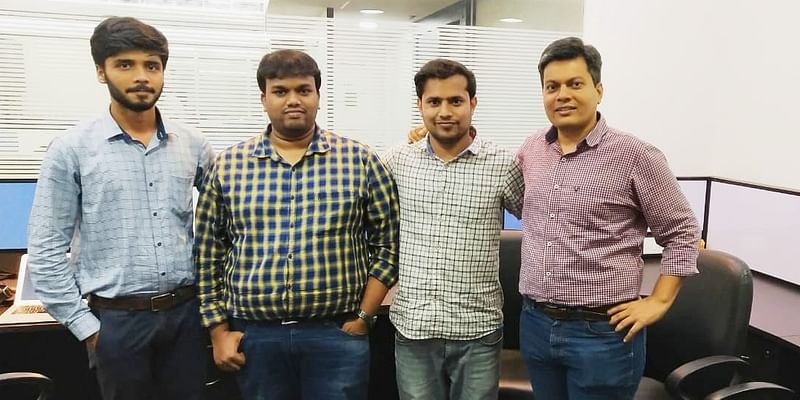For 41-year old Atul Kumar, sourcing fruits and vegetables was always a challenge. The co-founder of Accel-backed edtech startup Edupristine often wondered why the grocery supply chain was always broken.
“It was during the birth of my second child that I came across the challenge of sourcing hygienic and farm fresh vegetables and fruits for my family, and it struck a chord,” Atul says.

The Fraazo team
He says, after careful consideration and deliberation with his fellow co-founders, Vikas Dosala, Sumit Rai, and Aashish Krishnatre, they figured the traditional mandi system was archaic, and was giving way to newer models after the abolishment of the APMC act.
This led them to start Fraazo in 2016 in Powai, Mumbai. The consumer agritech startup is a fresh produce store that provides customers with farm-fresh groceries at their doorstep.
In order to get further scale and grow, Fraazo in 2018 became a part of the retail brand of VnF Ideas Private Limited, one of Mumbai’s leading agritech players providing farm-fresh vegetables and fruits to retail consumers and businesses. In 2019, the team launched its online store and hyperlocal model in chosen catchments across Mumbai and Pune.
As of today, the team claims to be serving over 200,000 households in Mumbai and Pune.
The founders are part of IIT and IIM alumni networks. Atul is an IIT-Kharagpur and IIM-Indore graduate; Vikas is an IIT-Madras and IIM-Calcutta graduate; Sumit did his BE from University of Mumbai and has previously worked with Foodpanda, and Aashish is from IIT-Guwahati.
What does the platform do?
Like any farm-to-fork model, Fraazo has tied up with farmers and producers to get fresh produce, which is then delivered to consumers. The team has joined hands with the VnF network of farmers; it has not disclosed the number of farmers it has tied up with.
“We have access to over 200,000 households. Our subscribers have been growing at a fast clip since the COVID-19 pandemic-driven lockdown came into force. Starting with our first grocery store in Powai, we have extended our presence across suburbs of Andheri (East and West) in Mumbai, and Magarpatta, Hinjewadi, and Koregaon Park across Pune,” Atul says.
However, a significant challenge was to understand the nuances that every stock keeping unit (SKU) requires in the vegetables and fruits segment post-harvest - most importantly the handling processes and their efficiency. The complexity of handling multiple products has been one of the important learnings for Fraazo.
According to the startup, another challenge was operational efficiency, which changes with growing scale. The parameters which worked well for a daily demand of five tonnes do not work when it comes to handling 25 tonnes a day.
The operations
The team claims to be handling over 125 SKUs of fresh vegetables and fruits. Being a brand focused on farm-fresh foods, it has organised its business model to suit these requirements.
“Our team has learnt the need to be operationally nimble and that has been one of the important factors for our success. Apart from the supply chain management and operational flexibility, we believe technology has played an important role to help us deliver quality and hygiene. Real-time tracking from farm to doorstep, route optimisation, and load factor analysis are important technological facets of our business. Equally important is the development of a front-end platform for customers, the Fraazo App, which focuses on delivering a proposition valued by our customers,” Atul explains.
The business
According to a report by Maple Capital Advisors, investments from venture capital firms in agritech startups are expected to exceed $500 million (around Rs 3,730 crore) in the next two years as entities engaged in helping farmers, enabling financing for them, and enhancing farm mechanisation attract significant interest.
Fraazo started with seed funding, and later raised $2 million from Equanimity Ventures, Gujarat Venture Finance Limited, and the family office of Manish Choksi of Asian Paints.
The startup clocked revenues of Rs 18 lakh in October 2019, and claims to have witnessed exponential growth of close to 10x over the last two quarters. It expects to maintain this pace next year.
The team also ventured into the B2B space through its brand FreshVnF, which has been operational since its inception in May 2018.
Atul says, “The important part is that every retail centre of Fraazo is mapped on the platform, and you will see only products which are available in the retail store serving your location, helping us limit the possible surprises for a customer at the time of delivery.”
“Further, digital payments help us remove the challenge of collecting and reconciling cash transactions, and save a few channels still partly dependent on cash,” Atul says. He adds that contactless delivery has come into focus since the COVID-19 pandemic. ""However, at Fraazo, we have always favoured minimal human intervention and maximum experience.”
According to the founders, the key cost heads are the costs of procuring vegetables and deploying manpower across the supply chain, which account for 75-80 percent of the costs. Apart from that, transportation is an important cost element, and load balancing across various routes plays a very important role in the unit economics.
“Wastage in various forms, whether it is from moisture loss, processing loss, physical wastage, transportation damages, etc., plays a very crucial role and could make or break a business in this segment. We have been fortunate enough to have utilised our technology platform to help us balance these factors, although we still continue to chase break-even, which is expected to happen during the latter part of FY21,” Atul says.
Competition and the future
While the team refused to share details of the costs, Atul says their charges are competitive and in sync with the market.
Currently, Fraazo competes with the likes of Ninjacart and Bigbasket. The team is also competing with Zomato’s B2B arm Hyperpure. Fraazo is available on Dunzo, Swiggy, and Zomato as well.
The team counts almost all leading cloud kitchens in Western India among its valued clients, including Swiggy, Box8, and several independent fine dining restaurants and cafeterias.
Fraazo says the HORECA segment contributes a significant portion of its sales and is set to grow as the lockdown is eased over the next six months.
“We are looking to serve one million households in the twin cities of Mumbai and Pune in the next 18-24 months by deploying technology to improve productivity and customer experience, and providing absolute market linkage to over 10,000 farmers would be our key targets in the coming years. Additionally, embedding point-to-point traceability is on our radar and so is the opportunity to expand our product offering to value-added products in the vegetables and fruits space,” Atul says.
(Edited by Megha Reddy)
Want to make your startup journey smooth? YS Education brings a comprehensive Funding Course, where you also get a chance to pitch your business plan to top investors. Click here to know more.
Link : https://yourstory.com/2020/07/mumbai-agritech-farm-to-fork-startup-fraazo
Author :- Sindhu Kashyaap ( )
July 27, 2020 at 05:40AM
YourStory



